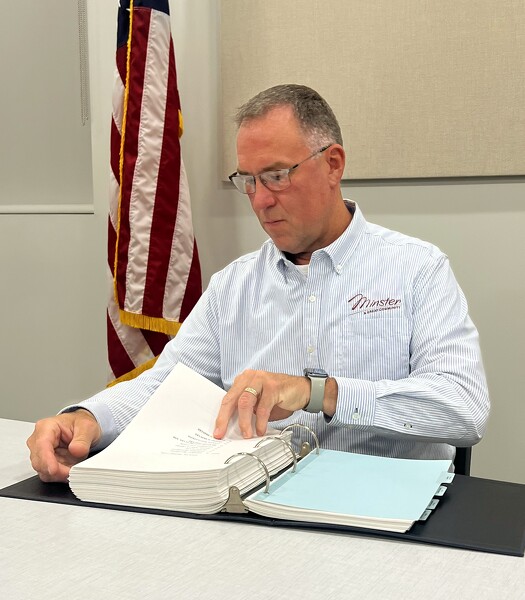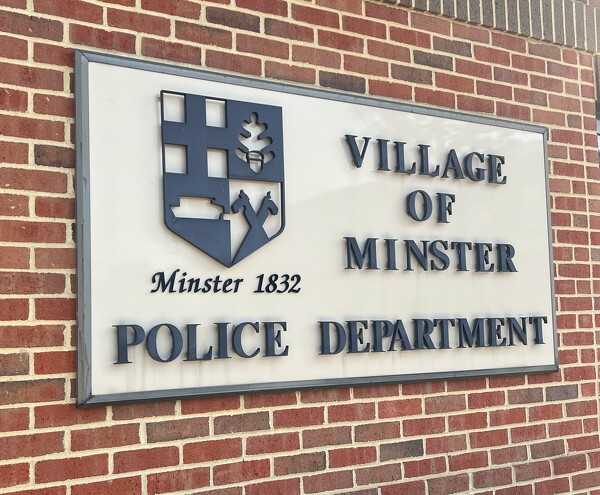
Mayor Craig Oldiges works in Minster's mayor's court. Mayors are not required to be judges or hold a law degree to oversee a mayor's court.
MINSTER - Unlike a typical American courtroom, this court has no jury. It has no bailiff. It doesn't even have a judge.
Despite that, mayor's courts offer a more relaxed, personable way for Ohio municipalities with at least 200 residents to legally handle traffic violations, minor misdemeanors and other offenses that do not result in jail time.
This is the case in Minster, where Mayor Craig Oldiges said he handles maybe 15-20 cases a year, primarily related to property code and traffic violations.
"Obviously if it's a juvenile case, we can't hear it," he said. "Most of what we're hearing here are a lot of speeding tickets. (Or) they ran a stop sign and the officer caught him for running the stop sign, but they thought they stopped."
More often than not, the minor infractions don't even make it to Oldiges' "courtroom," which is located in a conference room at the Minster Police Department. Those with tickets or violations usually either pay their fine at the front desk or remedy any property code violations they committed before they would end up in court.
But if someone does decide to challenge an alleged infraction, they receive a court date within 30 days of the reported violation, and have what Oldiges described as "a more relaxed" hearing with him, the charging Minster police officer and administrative assistant Rachel Ranly.
Minster tentatively holds mayor's court at 5:30 p.m. on the first and third Tuesday of the month, though Oldiges said it's often cancelled because there are no hearings needed.
Mayor's court sessions are not open to the public.
"There's no media, there's no big cameras … you know, we're not hearing any kind of murders or crazy stuff like that," Oldiges said. "It's pretty minuscule violations, or I would consider them to be."
The quasi-courtroom in Minster is set up to mimic a typical courtroom, but there's no grand judge's bench, there aren't any wooden pews and there's no jury's box. Still, Oldiges does sit at a separate table facing the defendant and charging officer, and is flanked by the United States and Ohio flags as required.
"The plaintiff sits there. I sit up there, we have a little conversation, the officer will sit over here, and then Rachel sits over here as the clerk. It's just a 'Let's have a talk' (situation)," he said.

The Minster mayor's court is held twice a month at the village police department.
The Minster mayor's court is one of five in Auglaize County. According to the Supreme Court of Ohio database, there are also such courts in Cridersville, New Bremen, New Knoxville and Waynesfield. Next door in Mercer County, there are only two: Rockford and Coldwater.
Statewide, there were around 274 mayor's courts active in 58 counties in 2024, the database shows. All of those courts are governed by the state Supreme Court and follow the same rules. Ohio is one of two states, along with Louisiana, to still allow the local judicial program.
Mayors are not required to be judges or even hold a law degree in Ohio to oversee a mayor's court.
The Ohio mayor's court bench book merely states that mayors are required to obtain an initial minimum of six hours of classroom instruction related to the structure of the state judicial system, the state constitution, Ohio Revised Code and other general principals of law applicable to the hearing and determination of prosecutions other than those related to alcohol- or drug-related traffic offenses.
After complying with those initial education requirements, mayors are required to complete three hours of continued education each year, the bench book states.
Oldiges said he attends eight hours of "refresher courses" a year, half of which covers general offenses with the other half covering OVI offenses.
Though he said he is certified to hear OVI cases, if someone wants to fight that specific infraction, Oldiges said he commonly turns it over to Minster's magistrate, attorney Tom Guillozet of Versailles.
Minster's court had 34 new court filings in 2024, and all were cleared up by the year's end, the Supreme Court database states.
Though some organizations, like the ACLU, suggest mayor's courts lack transparency and don't require enough training, Oldiges maintained that Minster's court is fair, and offers a much more personable and convenient experience than traveling all the way to Wapakoneta or St. Marys.
In addition, Ohio mayor's courts are required to file annually, quarterly and even monthly with the state Supreme Court, he said.
"It's not about making money, it's not about bringing money in. That's the least of our worries," he added. "It's to help the people in the community or those that pass through the community, to simplify that process of having to deal with whatever violations, whether it's a moving violation, a property code violation, or whatever it might be."
